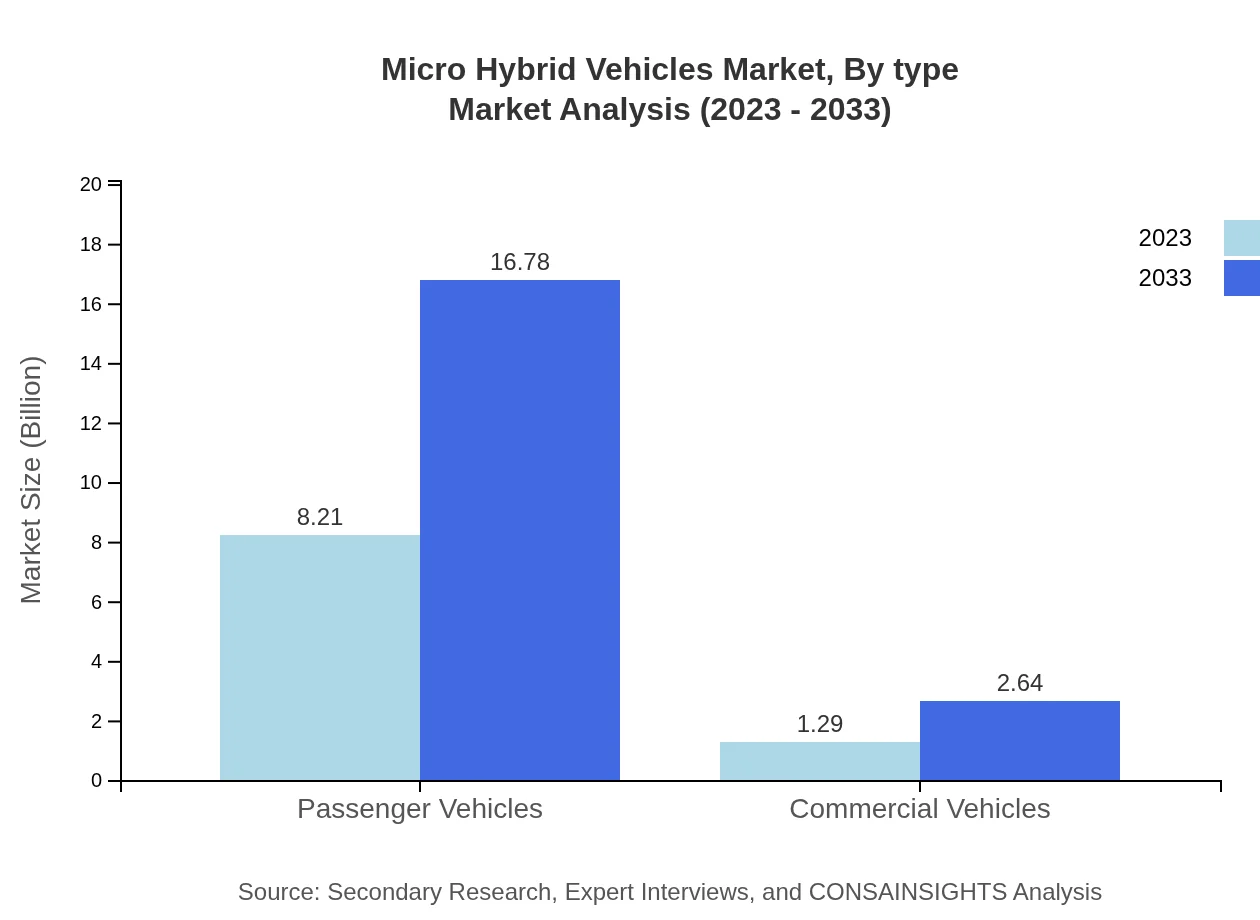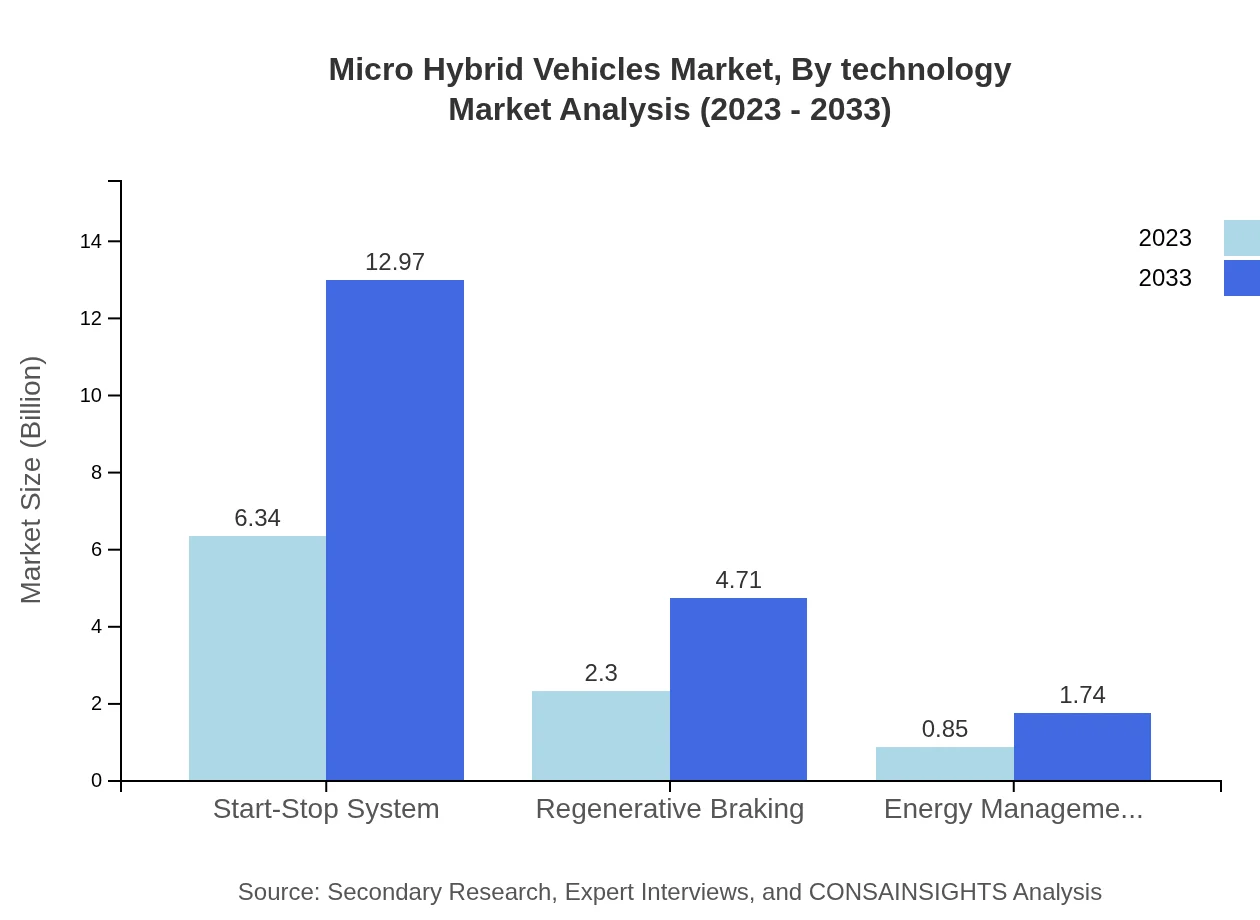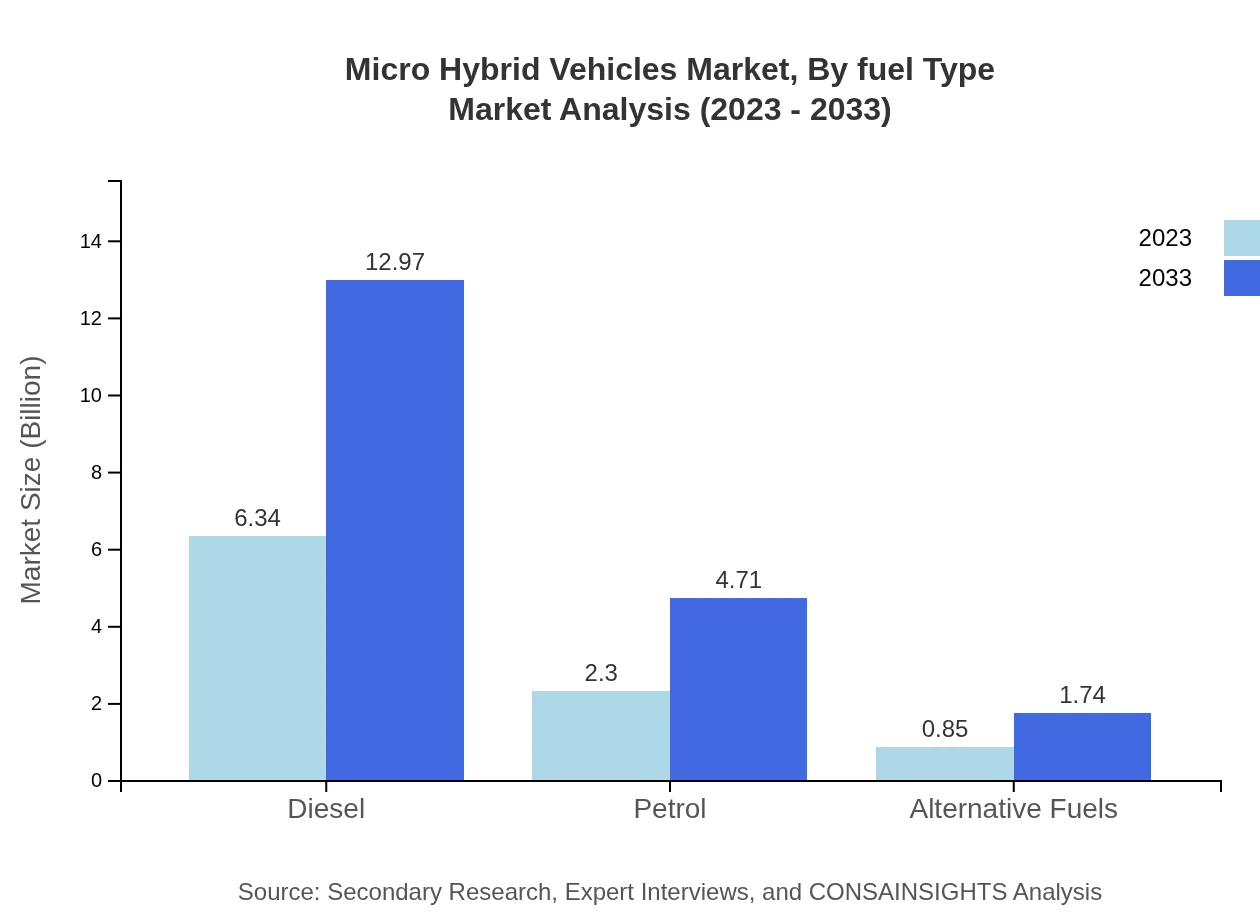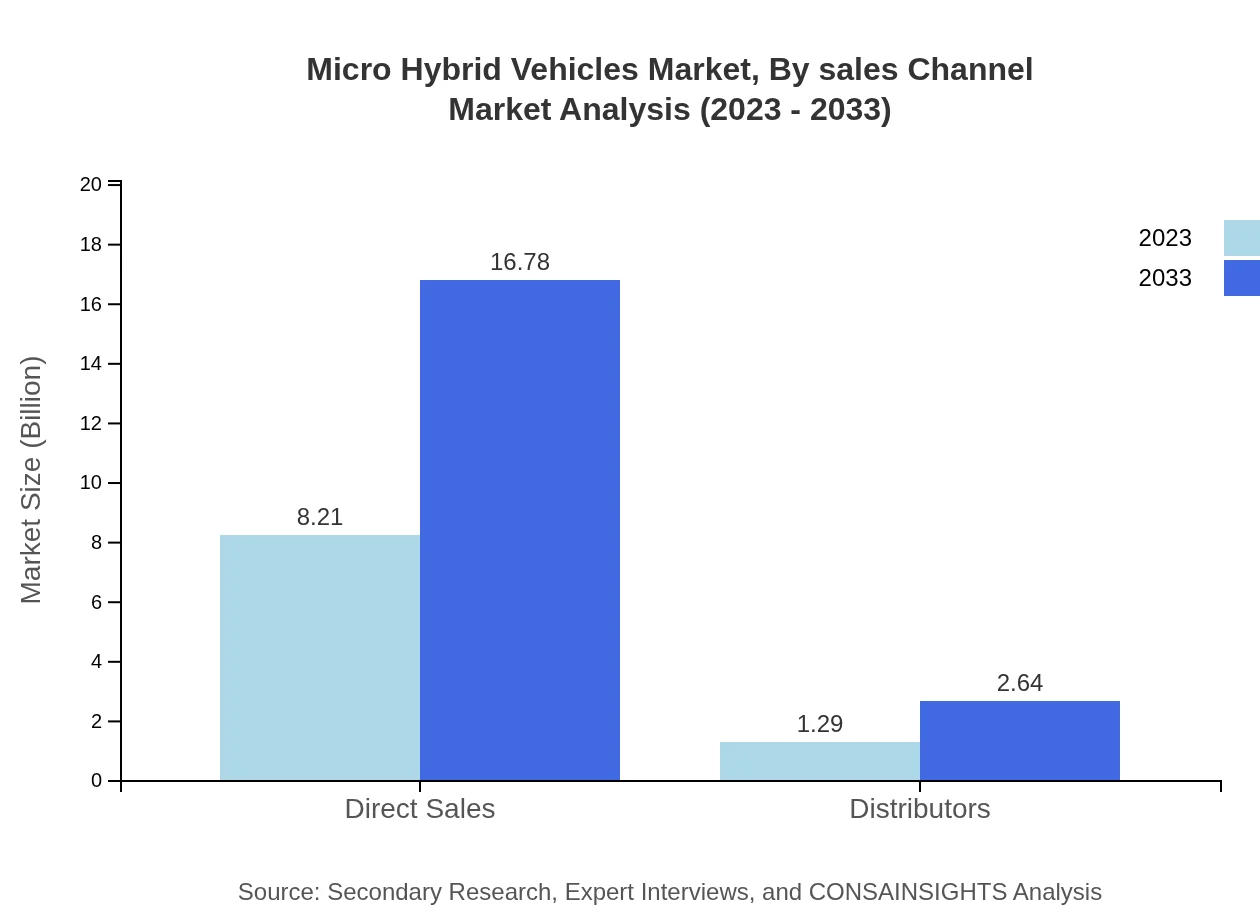Micro Hybrid Vehicles Market Report
Published Date: 02 February 2026 | Report Code: micro-hybrid-vehicles
Micro Hybrid Vehicles Market Size, Share, Industry Trends and Forecast to 2033
This report provides a comprehensive analysis of the Micro Hybrid Vehicles market, focusing on trends, technologies, and growth forecasts from 2023 to 2033. It includes market sizing, competitive landscape, and insights on regional performances to facilitate informed decision-making.
| Metric | Value |
|---|---|
| Study Period | 2023 - 2033 |
| 2023 Market Size | $9.50 Billion |
| CAGR (2023-2033) | 7.2% |
| 2033 Market Size | $19.42 Billion |
| Top Companies | Toyota Motor Corporation, Ford Motor Company, BMW AG, Volkswagen AG |
| Last Modified Date | 02 February 2026 |
Micro Hybrid Vehicles Market Overview
Customize Micro Hybrid Vehicles Market Report market research report
- ✔ Get in-depth analysis of Micro Hybrid Vehicles market size, growth, and forecasts.
- ✔ Understand Micro Hybrid Vehicles's regional dynamics and industry-specific trends.
- ✔ Identify potential applications, end-user demand, and growth segments in Micro Hybrid Vehicles
What is the Market Size & CAGR of Micro Hybrid Vehicles market in 2023?
Micro Hybrid Vehicles Industry Analysis
Micro Hybrid Vehicles Market Segmentation and Scope
Tell us your focus area and get a customized research report.
Micro Hybrid Vehicles Market Analysis Report by Region
Europe Micro Hybrid Vehicles Market Report:
In Europe, the micro hybrid vehicles market size is projected to increase from $3.32 billion in 2023 to $6.78 billion by 2033. The European market is characterized by stringent emission regulations and high consumer demand for greener transportation solutions, driving the adoption of micro hybrid systems.Asia Pacific Micro Hybrid Vehicles Market Report:
In 2023, the Asia Pacific market for micro hybrid vehicles is valued at $1.73 billion and is expected to grow to $3.53 billion by 2033. The region's growth is driven by a large consumer base, rapid urbanization, and government incentives promoting eco-friendly vehicles. Countries such as China and Japan are leading the charge with extensive hybrid vehicle adoption.North America Micro Hybrid Vehicles Market Report:
North America's micro hybrid vehicle market is valued at $3.25 billion in 2023, with expectations to grow to $6.64 billion by 2033. The region benefits from robust regulatory frameworks encouraging fuel-efficient vehicles and the presence of numerous key automakers advancing micro hybrid technologies.South America Micro Hybrid Vehicles Market Report:
The South American micro hybrid vehicles market is estimated at $0.89 billion in 2023 and is projected to reach $1.82 billion by 2033. The region's expanding automotive sector and increasing environmental awareness among consumers propel the demand for micro hybrid technology.Middle East & Africa Micro Hybrid Vehicles Market Report:
The Middle East and Africa market for micro hybrid vehicles is estimated at $0.32 billion in 2023, with expectations to reach $0.65 billion by 2033. The gradual shift towards sustainability and eco-friendly vehicles, along with infrastructural improvements, is anticipated to drive market growth in this region.Tell us your focus area and get a customized research report.
Micro Hybrid Vehicles Market Analysis By Type
The Micro Hybrid Vehicles market is significantly dominated by passenger vehicles, which are projected to grow from $8.21 billion in 2023 to $16.78 billion by 2033, maintaining a market share of 86.4%. Commercial vehicles are also gaining traction, with sizes expected to double from $1.29 billion to $2.64 billion, accounting for 13.6% of the market share.
Micro Hybrid Vehicles Market Analysis By Technology
The technological landscape of the market showcases the start-stop system as a key player, projected to grow from $6.34 billion in 2023 to $12.97 billion by 2033, capturing a significant share of 66.78%. Regenerative braking technology is also projected to see growth, expanding from $2.30 billion to $4.71 billion, holding a market share of 24.24%. The energy management system, while smaller, is expected to grow from $0.85 billion to $1.74 billion, representing an 8.98% share.
Micro Hybrid Vehicles Market Analysis By Fuel Type
In terms of fuel type, diesel remains dominant with expectations to grow from $6.34 billion to $12.97 billion, maintaining a share of 66.78%. Petrol vehicles are anticipated to grow from $2.30 billion to $4.71 billion, retaining a 24.24% market share, while alternative fuels are set to increase from $0.85 billion to $1.74 billion, capturing an 8.98% share.
Micro Hybrid Vehicles Market Analysis By Sales Channel
Direct sales of micro hybrid vehicles contribute significantly to the market, anticipated to grow from $8.21 billion in 2023 to $16.78 billion by 2033, maintaining a dominant share of 86.4%. Distributors also play a crucial role, expected to grow from $1.29 billion to $2.64 billion, achieving a 13.6% share.
Micro Hybrid Vehicles Market Trends and Future Forecast
Tell us your focus area and get a customized research report.
Global Market Leaders and Top Companies in Micro Hybrid Vehicles Industry
Toyota Motor Corporation:
Toyota is a leading innovator in hybrid technology, with a broad range of micro hybrid vehicles that exemplify sustainability and efficiency.Ford Motor Company:
Ford is a key player in the micro hybrid market, focusing on integrating modern technologies across its vehicle lineup to enhance fuel efficiency.BMW AG:
BMW is recognized for its commitment to automotive innovation, effectively blending luxury with eco-friendly driving experiences through its micro hybrid technologies.Volkswagen AG:
Volkswagen is heavily invested in hybrid vehicle development, offering a variety of micro hybrid models aimed at reducing carbon footprints globally.We're grateful to work with incredible clients.









FAQs
What is the market size of Micro Hybrid Vehicles?
The global market size for Micro Hybrid Vehicles is projected at $9.5 billion in 2023, with a robust CAGR of 7.2% anticipated until 2033. This growth reflects an increasing demand for fuel-efficient vehicles across various regions.
What are the key market players or companies in the Micro Hybrid Vehicles industry?
Key players in the Micro Hybrid Vehicles market include major automotive manufacturers and suppliers focused on energy-efficient technologies. Notable companies often lead through innovation in hybrid technologies, sustainable practices, and competitive pricing strategies.
What are the primary factors driving the growth in the Micro Hybrid Vehicles industry?
The growth of the Micro Hybrid Vehicles industry is primarily driven by increasing environmental regulations, rising fuel prices, and consumer demand for more fuel-efficient and sustainable vehicle options. Technological advancements in hybrid systems also bolster market expansion.
Which region is the fastest Growing in the Micro Hybrid Vehicles market?
The fastest-growing region in the Micro Hybrid Vehicles market is Europe, projected to increase from $3.32 billion in 2023 to $6.78 billion by 2033. Asia Pacific also shows strong growth, expanding from $1.73 billion to $3.53 billion in the same period.
Does ConsainInsights provide customized market report data for the Micro Hybrid Vehicles industry?
Yes, ConsainInsights offers customized market report data tailored to specific needs in the Micro Hybrid Vehicles industry. Clients can request data segmentation, regional insights, and targeted analysis to make informed decisions.
What deliverables can I expect from this Micro Hybrid Vehicles market research project?
Expect deliverables including comprehensive reports detailing market size, growth forecasts, competitor analysis, regional insights, and segmentation data for passenger and commercial vehicles. Additionally, trend analysis and strategic recommendations will be provided.
What are the market trends of Micro Hybrid Vehicles?
Market trends indicate a shift towards greater adoption of Micro Hybrid Vehicles, with a focus on passenger vehicles that dominate the market share at 86.4%. Additionally, technologies such as Start-Stop Systems and Regenerative Braking are gaining traction.





